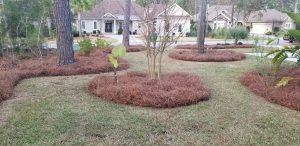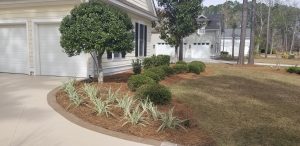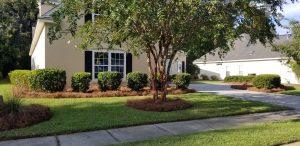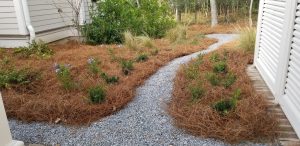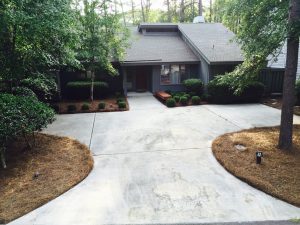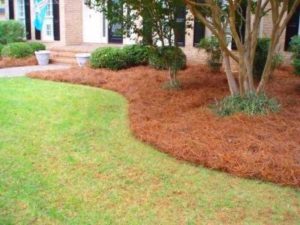Long-leaf pine straw in Bluffton, SC
Quick Pine Straw Facts:
- Appearance: Good to Excellent
- Insulation: Good
- Cost: Average (equal to in cost when comparing with premium hardwood bark mulches)
- Thickness: 1 bales covers 35 square feet 2” – 3” thick
- Weed Control: Good
- Water Penetration: Excellent
- Moisture Retention: Good
- Decomposition Speed: Medium-Fast
- Durability: Good
- Comments: Often used with acid-soil loving plants
Benefits of Long-leaf Pine Straw as Mulch
- Pine straw insulates tender roots from temperature extremes. As a result, it keeps the soil warm during cold spells and cool during hot spells.
- Reduces water evaporation rates and moisture loss to your soil.
- Encourages water infiltration into your soil which reduces runoff.
- Pine Straw Eliminates erosion caused by wind and rain-splash impact.
- Protects against soil compaction in your beds by reducing the rain impact directly on the surface.
- Aids in promoting favorable soil balance for healthy root growth.
- Old needles to do not have to be removed. All you have to do is put fresh straw on the top of old straw to revitalize the color and provide beds with new nutrients.
- Pine straw is a RENEWABLE RESOURCE.
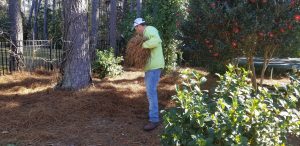
Benefits the Environment
The number one mulching material used in landscape plantings in the lowcountry is long-leaf pine needle mulch (pine straw). Because pine straw is actually a leaf (needle), it will benefit the environment in the same way that decomposing leaves benefit the forest floor. It will recycle nutrients and maintains soil organic matter in a compost-like fashion.
NO Trees are destroyed in the process of harvesting pine needles so the carbon footprint for harvesting pine needles vs. other mulches is very low. The majority of pine needle harvesting is done by hand, manually using a rake. The pine straw is raked into piles, and then placed into a wooden box for baling.
Pine Straw is good for plants
Pine Straw creates favorable growing conditions for plants by creating an environment that stimulates healthy plant development. It promotes uniform plant growth because it slowly decomposes to release organic nutrients that enrich the soil. The biggest benefit to pine straw is insulation. Your plant’s root system and the lower stems of plants will stay cooler in warm weather and remain warmer in colder weather. A layer of long leaf Pine Straw will help keep the roots of tender plants from freezing.
During hard rains and heavy winds, pine Straw will interlock and hold together. As a result, it does not wash out of beds like other mulches. Many mulches do not allow water to runoff (rain and/or irrigation), but pine straw allows water to flow through to the soil underneath. It also allows water to flow through it which also helps conserve soil moisture by reducing water evaporation rates and moisture loss. Pine straw also has the added benefit of reducing erosion caused by wind and rain-splash impact. It does not wash away as easily as other mulches during heavy rain.
Popular
Pine straw has been a popular landscape ground cover throughout Bluffton SC for the past 25 years. We use pine straw that is from local suppliers like Taylor’s and Ace Hardware. It is one of the most widely used mulches for all size projects. Long Needle Pine Straw is an aesthetically appealing mulch and can be used in a variety of landscapes. Pine straw will enhance the texture, color, contrast, weed-deterrent capabilities and uniqueness of your landscaping. The fine texture and uniform color of pine straw is more aesthetically pleasing to some people than traditional wood bark mulch.
Landscape Mulch
Landscape Mulch is one of the best things you can do for your landscaping beds in Bluffton SC. This is the act of placing a protective barrier (mulch) around your plants and over your bare soil. This protective barrier can be made up of a variety of decomposing organic materials. These materials include bark or wood chips (from various tree species), pine needles, straw, and cocoa bean shells, or non decomposing, non-organic materials such as black plastic, landscaping fabric, recycled tires, pebbles, and river rock.
The advantages of mulching are vast, but we will just talk about 6 of the biggest advantages.
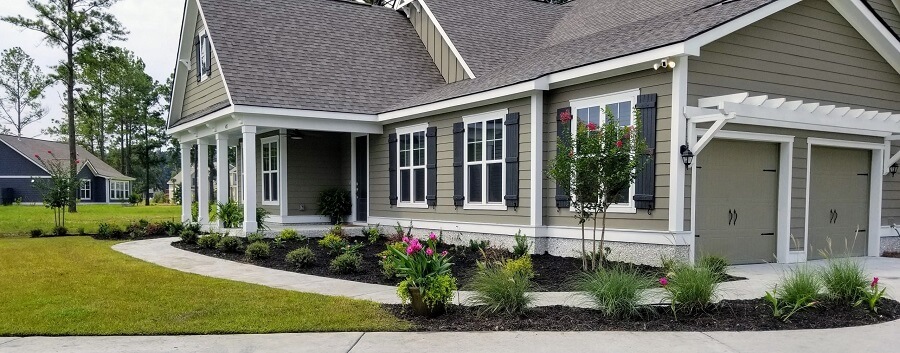
Mulch Controls Pests
Using certain types of landscape mulch, such as cedar mulch or nuggets, can deter certain pests. For example, cedar bark has natural oils that act as insect repellent. Be careful though, some mulches can encourage insects to flock to your garden and sometimes your house, so be sure to research which type of mulch will best suit your needs.
Prevents Soil Erosion
Mulch keeps water trapped in the soil as well as keeping rainwater from washing away your soil. It breaks the fall of the water and therefore lessening the force when the water impacts the ground.
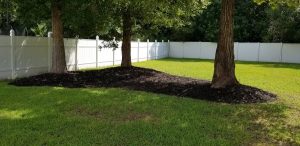
Weed Control
Regular, yearly installation of landscape mulch will limit the amount of weeds that spring up in the open spaces of your landscape beds or garden. Mulch acts as a barrier which limits the amount of sunlight and air that can help weeds grow.
Retains Moisture
Organic mulch absorbs water. Mulch covers the soil and limits evaporation. Retaining moisture during hot, dry seasons will help your plants as well as your water bill. The habit of refreshing your mulch yearly will dramatically help your landscape beds.
A common error is that mulch is piled up against the bottom of shrubs and plants. This practice can lead to fungus or insect issues. We generally suggest 2″-3″ of mulch for your landscape beds.
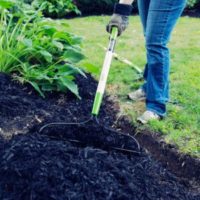
Improves Soil Nutrients
Mulch keeps nutrients in the soil from being washed away with the rain. It also releases nutrients into the soil if you are use organic materials. When mulch decomposes, the organic material slowly seeps into the soil.
Encourages Earthworms
Using mulch for landscape beds will encourage earthworms to occupy your soil. And as any good landscaper in Bluffton will tell you, earthworms help improve the soil for your plants and shrubs.


